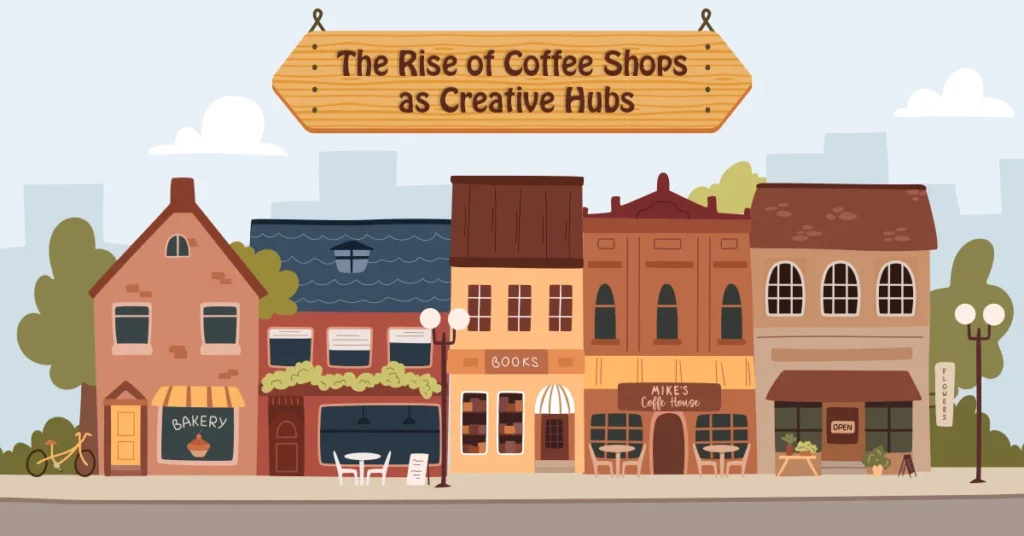
Coffee shops have long been recognized as spaces where creativity flows as freely as the coffee itself. Their evolution from simple places to enjoy a drink to hubs of innovation and creativity mirrors broader social and cultural shifts. This transformation can be traced back through history, reflecting changing societal needs and the increasing importance of flexible, welcoming spaces for work and socialisation.
Historical Context
The coffee shop’s journey from its origins in the Middle East in the 15th century to the heart of modern urban life worldwide is a fascinating story of adaptation and social importance. Initially, coffee houses served as meeting places for intellectual discussion, political debate, and social interaction. In cities like London and Paris, they became known as “penny universities,” where for the price of a cup of coffee, one could engage in rich conversations and exchange ideas. This historical role as centres for thought and communication has laid the foundation for their modern incarnation as creative hubs.
The Evolution of Coffee Culture
The evolution of coffee culture has been a fascinating journey, with coffee shops transforming from simple gathering places to sophisticated establishments that offer a wide range of coffee varieties and experiences. In Southeast Asia, the traditional kedai kopi (coffee shop) has been a staple of local culture, serving as a community hub where people gather to socialize and enjoy a cup of coffee.
Over time, these coffee shops have evolved to incorporate elements of Western cuisine and modern amenities, while still maintaining their traditional charm. Today, coffee shops are an integral part of urban culture, offering a unique blend of coffee, food, and community that appeals to people of all ages and backgrounds. This blend of old and new creates a dynamic environment where tradition meets innovation, making coffee shops a beloved part of daily life.
Significance Today
In today’s fast-paced world, coffee shops have become more than just places to enjoy a beverage; they are vital social and creative spaces. They offer an accessible environment for individuals from various backgrounds to meet, collaborate, and generate new ideas. The unique atmosphere of coffee shops — characterised by a blend of comfort, casualness, and a stimulating environment — fosters creativity and productivity. For freelancers, entrepreneurs, and students, these spaces offer the dual benefits of flexibility and community, making them preferred workplaces outside the traditional office or home setting.
Moreover, the rise of digital technology has further cemented the coffee shop’s role as a creative hub. With the advent of Wi-Fi, coffee shops have transformed into gateways to the digital world, where individuals can work on their projects while still being part of a vibrant, physical community. This blend of offline and online interaction enriches the creative process, offering inspiration and opportunities for collaboration that are hard to find in more isolated settings.
In essence, the rise of coffee shops as creative hubs reflects a broader societal shift towards valuing communal spaces that promote flexibility, innovation, and connectivity. They serve as modern-day salons, where the exchange of ideas and the pursuit of creative endeavours are encouraged and facilitated by the inviting ambiance and the shared love for coffee.
The Creative Influence of Coffee Shops

Coffee shops have emerged as significant catalysts for creativity, influenced by both their design and the unique psychological atmosphere they foster. The environment of a coffee shop — from its architectural layout to the ambient noise level — plays a crucial role in facilitating creative thinking and productivity.
Architectural and Environmental Factors
Design and Layout: The architecture of coffee shops is often designed to promote comfort and creativity. Open spaces with natural light, comfortable seating, and minimalistic decor encourage patrons to settle in and engage in creative pursuits. The layout often includes communal tables, which invite collaboration, and smaller, more private areas for those requiring focus and solitude. This balance allows individuals to find a space that matches their creative process.
The Atmosphere of Productivity: There is a particular energy in coffee shops that inspires productivity. The background hum of conversation and the clinking of cups create an ambient noise level that research suggests is optimal for creative cognition. This ambient noise, combined with the visual stimulation of people coming and going, provides a dynamic environment that can fuel creative thought and work.
The Psychological Impact
Coffee as a Creative Stimulant: Beyond the physical space, coffee itself is a stimulant that can enhance mental clarity, focus, and energy levels, contributing to the creative process. The ritual of drinking coffee can also serve as a mental cue, signalling the brain that it’s time to concentrate and be productive.
The rich and enjoyable taste of the coffee and food offerings further enhances the experience, emphasizing the quality and satisfaction derived from them.
The Role of Routine and Familiarity: Regular visits to a favourite coffee shop can establish a routine that might be conducive to creativity. The familiarity of the space, the staff, and even the menu can create a comforting environment that reduces stress and frees the mind to focus on creative tasks. This sense of routine and belonging can be especially beneficial for those who work in creative fields, providing a stable backdrop against which ideas can flow more freely.
Fostering Social Connections

The role of coffee shops extends beyond just nurturing individual creativity; they are pivotal in building and enhancing social connections. These establishments serve as neutral grounds where people from different walks of life can meet, share ideas, and forge new relationships.
The Social Dynamics of Coffee Shops
Networking and Casual Encounters: Coffee shops often facilitate unexpected meetings and networking opportunities. The casual and open environment makes it easy for individuals to strike up conversations with strangers, leading to professional collaborations or simply broadening one’s social circle. For many, these interactions are invaluable, providing insights and connections that would be difficult to find elsewhere.
Community and Belonging: Beyond individual encounters, coffee shops often act as community hubs, hosting events ranging from poetry readings to local business meetings. They offer a sense of belonging and place, where regular patrons become part of a community. This aspect of coffee shops is essential in an increasingly digital and isolated world, providing a physical space where real-world social networks can flourish.
Collaborations and Shared Spaces
Co-working in Coffee Shops: The rise of freelancing and remote work has led to an increase in co-working within coffee shops. These spaces offer a flexible alternative to traditional office environments, encouraging collaboration among individuals working on different projects. The informal setting can lead to spontaneous exchanges of ideas and partnerships that might not have occurred in more formal settings.
Events and Gatherings: Many coffee shops actively foster social connections by organising events that bring people together. Whether it’s workshops, book clubs, or music nights, these gatherings transform the coffee shop from a place of individual work into a vibrant community space, promoting social interactions and the sharing of creative ideas.
Coffee shops play a dual role in fostering creativity and social connections. They provide an environment that encourages creative work through their design and ambiance while also serving as venues for social interaction and community building. This unique combination makes them indispensable in the modern urban landscape.
Creating a Unique Coffee Shop Experience
Creating a unique coffee shop experience requires a deep understanding of your target audience and a clear vision for your brand. To stand out from the competition, consider offering high-quality coffee made from rare and exotic coffee beans, as well as a selection of delicious food items that complement your coffee offerings.
Your business model should prioritize customer experience, with a focus on creating a welcoming and inviting atmosphere that encourages customers to linger and socialize. By combining high-quality coffee, delicious food, and a unique atmosphere, you can create a coffee shop experience that sets you apart from the competition and builds a loyal customer base. This approach not only attracts new customers but also fosters a sense of community and belonging among regular patrons.
Serving High-Quality Coffee
Serving high-quality coffee is essential for any coffee shop, and requires a deep understanding of coffee beans, roasting, and brewing techniques. To serve the best coffee possible, consider sourcing high-quality beans from reputable suppliers, and invest in a skilled barista team that can expertly brew and serve your coffee offerings.
Consider offering a variety of coffee drinks, including pour-overs, lattes, and cappuccinos, as well as a selection of specialty coffee drinks that showcase your shop’s unique personality. By serving high-quality coffee, you can build a loyal customer base and establish your shop as a destination for coffee lovers. The commitment to quality not only enhances the customer experience but also sets a standard of excellence that distinguishes your shop in a competitive market.
Building a Team of Skilled Baristas and Staff
Building a team of skilled baristas and staff is essential for any coffee shop, and requires a focus on training, development, and customer service. To build a strong team, consider investing in barista training programs that teach the fundamentals of coffee brewing and service, as well as customer service skills that prioritize hospitality and friendliness.
Your staff should be knowledgeable about your coffee offerings and able to make recommendations to customers, as well as provide exceptional service that builds customer loyalty. By building a team of skilled baristas and staff, you can create a positive and welcoming atmosphere that sets your shop apart from the competition. A well-trained team not only enhances the quality of service but also contributes to the overall ambiance and reputation of your coffee shop.
Challenges and Considerations in the Business Model

As coffee shops evolve into creative and social hubs, they face a range of challenges and considerations that must be addressed to maintain their role effectively.
Navigating the Challenges
Overcrowding and Noise: One of the most significant challenges coffee shops face as they become popular workspaces is managing overcrowding and the noise level. The very atmosphere that fosters creativity can, when overly crowded, detract from productivity. Coffee shops must balance the welcoming of customers with creating a conducive environment for all, including those seeking a quieter space for concentration.
The Digital Divide: The transformation of coffee shops into quasi-offices has highlighted the digital divide. While many patrons benefit from free Wi-Fi and power outlets, this shift can alienate those who seek coffee shops for relaxation and social interactions, creating a divide between digital workers and traditional patrons. Addressing this involves thoughtful space design and perhaps designated areas or times for different activities.
Sustainability and Ethical Considerations
Environmental Impact: The coffee industry faces scrutiny regarding its environmental impact, from the use of disposable cups to the sourcing of coffee beans. Coffee shops are increasingly adopting sustainable practices, such as offering discounts for reusable cups or sourcing beans from ethical, sustainable farms. These practices not only reduce their environmental footprint but also appeal to environmentally conscious consumers.
Supporting Local Communities: Ethical considerations extend to how coffee shops can support local communities. This involves choosing to stock locally sourced food and products, creating jobs, and engaging in community events. Such practices help embed coffee shops into the fabric of the local community, fostering a sense of ownership and pride among patrons.
Marketing and Advertising Strategies
Marketing and advertising are essential for any coffee shop, and require a focus on social media, advertising, and customer engagement. To build a strong marketing strategy, consider developing a social media presence that showcases your shop’s unique personality and offerings, as well as advertising campaigns that target your local market.
Your marketing efforts should prioritize customer engagement, with a focus on building a loyal customer base that drives repeat business and referrals. Consider offering loyalty programs, promotions, and events that incentivize customers to visit your shop and share their experiences with friends and family. By combining a solid marketing strategy with a focus on customer engagement, you can build a successful coffee shop that attracts and retains customers. Effective marketing not only increases visibility but also fosters a sense of community and connection among your patrons.
The Future of Coffee Shops

Looking forward, coffee shops are likely to continue adapting to the needs of their patrons, reflecting broader trends in work, technology, and society.
Innovations and Trends
Technological Integration: Technology will play a pivotal role in the future of coffee shops, both in terms of enhancing the customer experience and streamlining operations. From app-based ordering to virtual reality coffee tastings, technological innovations could offer new ways to attract and engage customers.
Expanding the Concept: The concept of the coffee shop is expanding beyond just a place to enjoy coffee. Future coffee shops may incorporate a wider range of functions, serving as coworking spaces, event venues, or even educational centres. This evolution will likely continue as coffee shops seek to meet the diverse needs of their communities.
The Enduring Appeal of Coffee Shops
The future of coffee shops appears bright, with these spaces continuing to adapt and evolve. Despite the challenges, the core appeal of coffee shops — as spaces of connection, creativity, and community — remains unchanged. As society changes, coffee shops will likely continue to reflect and accommodate those shifts, maintaining their place as essential hubs in the fabric of urban life. By addressing challenges head-on and embracing innovation, coffee shops can continue to thrive, providing a welcoming space for all, irrespective of the reason for their visit.
About WDD Malaysia in Southeast Asia
As a premier web design Malaysia company, WDD Malaysia specializes in creating engaging websites with unique design approaches, ensuring every user interaction is memorable. We are coffee enthusiasts and love discussing our innovative website design services over a good brew. Passionate about converting standard web designs into remarkable digital experiences, we help your business stand out. Feel free to reach out for a cuppa!




